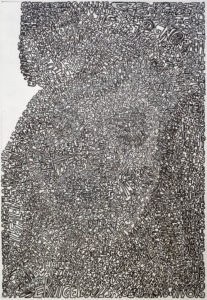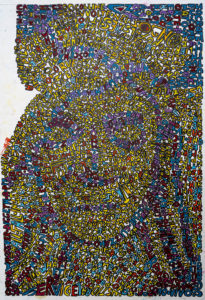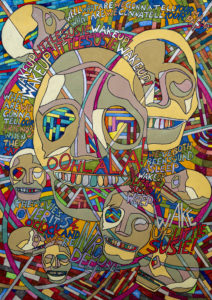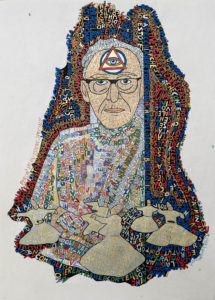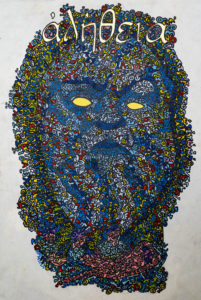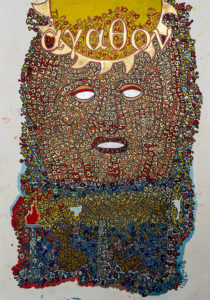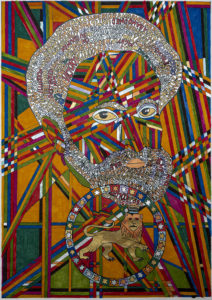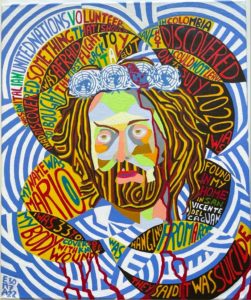The alphabet series
These paintings are made with secret words.
Click on each painting to expand and read the story inside each painting.
Something is rotten in Copenhagen (2021)
Oil, watercolor pencils and ink on paper, 42×30 cm
The skull that inspired this painting was retrieved from someone’s body, several months after the burial, around 9.000 thousand years ago, plastered and painted with ochre. It was found in the Neolithic site of Çatalhöyük, in the Southern Anatolian Plateau, in Turkey. It took a long time but it finally came out. Something is rotten in Copenhagen.
Wake up, little Susie, wake up
Wake up, little Susie, wake up
We’ve both been sound asleep
Wake up, little Susie and weep
The movie’s over, it’s four o’clock
And we’re in trouble deep
Wake up, little Susie
Well, what are we gonna tell your mama?
What are we gonna tell your pa’?
What are we gonna tell our friends when they say
“Ooh, la, la”?
Wake up, little Susie!
(Boudleaux and Felice Bryant)
PRICE: 1.800 CHF (framed, covered with glass)
Perché sei un essere speciale (2021)
Ink on paper, 42×30 cm
Franco Battiato (1945 – 2021)
‘And you will heal from all the diseases,
Because you’re a special being,
And I will take care of you’
‘The horizontal line
pushes us towards the matter,
the vertical one towards the spirit.
With closed eyelids
there is a glimpse of it,
that with time – and it takes patience,
it opens to the inner look:
inneres auge, das innere auge’
‘I want to see you dance
Like the gypsies of the desert
With candle holders on your head
Or like the Balinese on days of celebration
I want to see you dance
Like the Derviches Tourneurs
Who spin on their spines,
Or to the sound of Katakali anklets.
And the room spins around while we dance,
And the room spins around while we dance’
PRICE: 1.900 CHF (framed, covered with glass)
Apology of Socrates (2021)
Oil and ink on paper, 42×30 cm
Οὕτω γὰρ ἔχει, ὦ ἄνδρες Ἀθηναῖοι, τῇ ἀληθείᾳ· οὗ ἄν τις ἑαυτὸν τάξῃ ἡγησάμενος βέλτιστον εἶναι ἢ ὑπ’ ἄρχοντος ταχθῇ, ἐνταῦθα δεῖ, ὡς ἐμοὶ δοκεῖ, μένοντα κινδυνεύειν, μηδὲν ὑπολογιζόμενον μήτε θάνατον μήτε ἄλλο μηδὲν πρὸ τοῦ αἰσχροῦ. ἐγὼ οὖν δεινὰ ἂν εἴην εἰργασμένος, ὦ ἄνδρες Ἀθηναῖοι, εἰ ὅτε μέν με οἱ ἄρχοντες ἔταττον, οὓς ὑμεῖς εἵλεσθε ἄρχειν μου, καὶ ἐν Ποτειδαίᾳ καὶ ἐν Ἀμφιπόλει καὶ ἐπὶ Δηλίῳ, τότε μὲν οὗ ἐκεῖνοι ἔταττον ἔμενον ὥσπερ καὶ ἄλλος τις καὶ ἐκινδύνευον ἀποθανεῖν, τοῦ δὲ θεοῦ τάττοντος, ὡς ἐγὼ ᾠήθην τε καὶ ὑπέλαβον, φιλοσοφοῦντά με δεῖν ζῆν καὶ ἐξετάζοντα ἐμαυτὸν καὶ τοὺς ἄλλους, ἐνταῦθα δὲ φοβηθεὶς ἢ θάνατον ἣ ἄλλ’ ὁτιοῦν πρᾶγμα λίποιμι τὴν τάξιν. δεινόν τἂν εἴη, καὶ ὡς ἀληθῶς τότ’ ἄν με δικαίως εἰσάγοι τις εἰς δικαστήριον, ὅτι οὐ νομίζω θεοὺς εἶναι ἀπειθῶν τῇ μαντείᾳ καὶ δεδιὼς θάνατον καὶ οἰόμενος σοφὸς εἶναι οὐκ ὤν. τὸ γάρ τοι θάνατον δεδιέναι, ὦ ἄνδρες, οὐδὲν ἄλλο ἐστὶν ἢ δοκεῖν σοφὸν εἶναι μὴ ὄντα· δοκεῖν γὰρ εἰδέναι ἐστὶν ἃ οὐκ οἶδεν. οἶδε μὲν γὰρ οὐδεὶς τὸν θάνατον οὐδ’ εἰ τυγχάνει τῷ ἀνθρώπῳ πάντων μέγιστον ὂν τῶν ἀγαθῶν, δεδίασι δ’ ὡς εὖ εἰδότες ὅτι μέγιστον τῶν κακῶν ἐστι. καίτοι πῶς οὐκ ἀμαθία ἐστὶν αὕτη ἡ ἐπονείδιστος, ἡ τοῦ οἴεσθαι εἰδέναι ἃ οὐκ οἶδεν; ἐγὼ δ’, ὦ ἄνδρες, τούτῳ καὶ ἐνταῦθα ἴσως διαφέρω τῶν πολλῶν ἀνθρώπων, καὶ εἰ δή τῳ σοφώτερός του φαίην εἶναι, τούτῳ ἄν, ὅτι οὐκ εἰδὼς ἱκανῶς περὶ τῶν ἐν Ἅιδου οὕτω καὶ οἴομαι οὐκ εἰδέναι· τὸ δὲ ἀδικεῖν καὶ ἀπειθεῖν τῷ βελτίονι καὶ θεῷ καὶ ἀνθρώπῳ, ὅτι κακὸν καὶ αἰσχρόν ἐστιν οἶδα. πρὸ οὖν τῶν κακῶν ὧν οἶδα ὅτι κακά ἐστιν, ἃ μὴ οἶδα εἰ καὶ ἀγαθὰ ὄντα τυγχάνει οὐδέποτε φοβήσομαι οὐδὲ φεύξομαι·
ἀλλὰ γὰρ ἤδη ὥρα ἀπιέναι, ἐμοὶ μὲν ἀποθανουμένῳ, ὑμῖν δὲ βιωσομένοις· ὁπότεροι δὲ ἡμῶν ἔρχονται ἐπὶ ἄμεινον πρᾶγμα, ἄδηλον παντὶ πλὴν ἢ τῷ θεῷ.
Strange, indeed, would be my conduct, o men of Athens, if I who, when I was ordered by the generals whom you chose to command me at Potidaea and Amphipolis and Delium, remained where they placed me, like any other man, facing death; if, I say, now, when, as I conceive and imagine, the god orders me to fulfill the philosopher’s mission of searching into myself and other men, I were to desert my post through fear of death, or any other fear; that would indeed be strange, and I might justly be arraigned in court for denying the existence of the gods, if I disobeyed the oracle because I was afraid of death: then I should be fancying that I was wise when I was not wise. For this fear of death is indeed the pretence of wisdom, and not real wisdom, being the appearance of knowing the unknown; since no one knows whether death, which they in their fear apprehend to be the greatest evil, may not be the greatest good. Is there not here conceit of knowledge, which is a disgraceful sort of ignorance? And this is the point in which, as I think, I am superior to men in general, and in which I might perhaps fancy myself more wise than other men—that whereas I know but little of the world below, I do not suppose that I know: but I do know that injustice and disobedience to a better, whether god or man, is evil and dishonorable, and I will never fear or avoid a possible good rather than a certain evil. (…)
But let me interrupt. You see, the hour of departure has already arrived. So, now, we all go our ways—I to die, and you to live. And the question is, which one of us on either side is going toward something that is better? It is not clear, except to the god.
Plato
PRICE: 2.500 CHF (framed, covered with glass)
Πολιτεία - Politeia (2021)
Oil and ink on paper, 42×30 cm
Μετὰ ταῦτα δή, εἶπον, ἀπείκασον τοιούτῳ πάθει τὴν ἡμετέραν φύσιν παιδείας τε πέρι καὶ ἀπαιδευσίας. ἰδὲ γὰρ ἀνθρώπους οἷον ἐν καταγείῳ οἰκήσει σπηλαιώδει, ἀναπεπταμένην πρὸς τὸ φῶς τὴν εἴσοδον ἐχούσῃ μακρὰν παρὰ πᾶν τὸ σπήλαιον, ἐν ταύτῃ ἐκ παίδων ὄντας ἐν δεσμοῖς καὶ τὰ σκέλη καὶ τοὺς αὐχένας, ὥστε μένειν τε αὐτοὺς εἴς τε τὸ πρόσθεν μόνον ὁρᾶν, κύκλῳ δὲ τὰς κεφαλὰς ὑπὸ τοῦ δεσμοῦ ἀδυνάτους περιάγειν, φῶς δὲ αὐτοῖς πυρὸς ἄνωθεν καὶ πόρρωθεν καόμενον ὄπισθεν αὐτῶν, μεταξὺ δὲ τοῦ πυρὸς καὶ τῶν δεσμωτῶν ἐπάνω ὁδόν, παρ᾽ ἣν ἰδὲ τειχίον παρῳκοδομημένον, ὥσπερ τοῖς θαυματοποιοῖς πρὸ τῶν ἀνθρώπων πρόκειται τὰ παραφράγματα, ὑπὲρ ὧν τὰ θαύματα δεικνύασιν.
Ὁρῶ, ἔφη.
Ἄτοπον, ἔφη, λέγεις εἰκόνα καὶ δεσμώτας ἀτόπους.
Ὁμοίους ἡμῖν, ἦν δ᾽ ἐγώ: τοὺς γὰρ τοιούτους πρῶτον μὲν ἑαυτῶν τε καὶ ἀλλήλων οἴει ἄν τι ἑωρακέναι ἄλλο πλὴν τὰς σκιὰς τὰς ὑπὸ τοῦ πυρὸς εἰς τὸ καταντικρὺ αὐτῶν τοῦ σπηλαίου προσπιπτούσας; Πῶς γάρ, ἔφη, εἰ ἀκινήτους γε τὰς κεφαλὰς ἔχειν ἠναγκασμένοι
Eἰ οὖν διαλέγεσθαι οἷοί τ᾽ εἶεν πρὸς ἀλλήλους, οὐ ταῦτα ἡγῇ ἂν τὰ ὄντα αὐτοὺς νομίζειν ἅπερ ὁρῷεν;
Ἀνάγκη.
Παντάπασι δή, ἦν δ᾽ ἐγώ, οἱ τοιοῦτοι οὐκ ἂν ἄλλο τι νομίζοιεν τὸ ἀληθὲς ἢ τὰς τῶν σκευαστῶν σκιάς.
Πολλὴ ἀνάγκη, ἔφη.
Σκόπει δή, ἦν δ᾽ ἐγώ, αὐτῶν λύσιν τε καὶ ἴασιν τῶν τε δεσμῶν καὶ τῆς ἀφροσύνης, οἵα τις ἂν εἴη, εἰ φύσει τοιάδε συμβαίνοι αὐτοῖς· ὁπότε τις λυθείη καὶ ἀναγκάζοιτο ἐξαίφνης ἀνίστασθαί τε καὶ περιάγειν τὸν αὐχένα καὶ βαδίζειν καὶ πρὸς τὸ φῶς ἀναβλέπειν, πάντα δὲ ταῦτα ποιῶν ἀλγοῖ τε καὶ διὰ τὰς μαρμαρυγὰς ἀδυνατοῖ καθορᾶν ἐκεῖνα ὧν
τότε τὰς σκιὰς ἑώρα, τί ἂν οἴει αὐτὸν εἰπεῖν, εἴ τις αὐτῷ λέγοι ὅτι τότε μὲν ἑώρα φλυαρίας, νῦν δὲ μᾶλλόν τι ἐγγυτέρω τοῦ ὄντος καὶ πρὸς μᾶλλον ὄντα τετραμμένος ὀρθότερον βλέποι, καὶ δὴ καὶ ἕκαστον τῶν παριόντων δεικνὺς αὐτῷ ἀναγκάζοι ἐρωτῶν ἀποκρίνεσθαι ὅτι ἔστιν; οὐκ οἴει αὐτὸν ἀπορεῖν τε ἂν καὶ ἡγεῖσθαι τὰ τότε ὁρώμενα ἀληθέστερα ἢ τὰ νῦν δεικνύμενα
Τελευταῖον δὴ οἶμαι τὸν ἥλιον, οὐκ ἐν ὕδασιν οὐδ᾽ ἐν ἀλλοτρίᾳ ἕδρᾳ φαντάσματα αὐτοῦ, ἀλλ᾽ αὐτὸν καθ᾽ αὑτὸν ἐν τῇ αὑτοῦ χώρᾳ δύναιτ᾽ ἂν κατιδεῖν καὶ θεάσασθαι οἷός ἐστιν.
I continued – compare our nature, with regard to education and lack of education, to a situation of this kind. Inside an underground dwelling, similar to a cave, with the entrance open to the light, as wide as the whole width of the cave, imagine seeing men who have been inside it since childhood, chained legs and neck, so as to be immobilized and to be able to look only in front of them, prevented, by the chain, from turning around the head, and the light of a fire that burns behind them above and from afar; and between the fire and the prisoners, a causeway, along which he imagines that there is a wall, like those screens placed by the puppeteers in front of the spectators, above which they show the puppets ».
“I see it,” he replied. (…) “You are describing me a strange image – he observed – and strange prisoners.”
“They look like us – I replied – do you think such individuals can see something else about themselves and their companions, besides the shadows cast by the fire on the wall of the cave in front of them?”
“I see it,” he replied.
“If, then, they could converse with each other, don’t you think they would believe what they see real objects?”
“Obviously”.
“Now imagine – I resumed – what their liberation from chains and ignorance could be; admit that a case of the following kind naturally happened to them: that one of them had broken his chains and that all of a sudden he was forced to get up, to turn around his neck, to walk and look up to the light; and that, by doing all these things, he felt pain and was unable, having been dazzled, to see the objects whose shadows he was previously seeing; what do you think he would say if someone explained to him that before he saw vain and insipid things, and now, instead, being closer to what reality actually is, and aimed at objects that have more reality in them, he can see better? And if also, by showing him each of the objects that pass by, he is forced, by asking him, to answer what is each? Don’t you think he would remain doubtful and judge the things he saw earlier to be more true than those shown to him now?”
“In the end, I believe, he could observe and contemplate the sun, and not its images in the water or some other surface, but the sun in itself, in its own place”.
Plato
PRICE: 2.500 CHF (framed, covered with glass)
Words of Rastafari (2021)
Ink an markers on paper, 42×30 cm
Until the philosophy which holds one race superior and another inferior is finally and permanently discredited and abandoned. Until there are no longer first-class and second-class citizens of any nation, Until the color of a man’s skin is of no more significance than the color of his eyes, Until the basic human rights are equally guaranteed to all, without regard to race, Until that day, the dream of lasting peace, world citizenship, and the rule of international morality will remain in but a fleeting illusion to be pursued, but never attained.
Until that day, the African continent will not know peace. We Africans will fight, if necessary, and we know that we shall win, as we are confident in the victory of good over evil.
Now everywhere is war
Haile Selassie I
(Address to the United Nations, 1963)
PRIVATE COLLECTION
